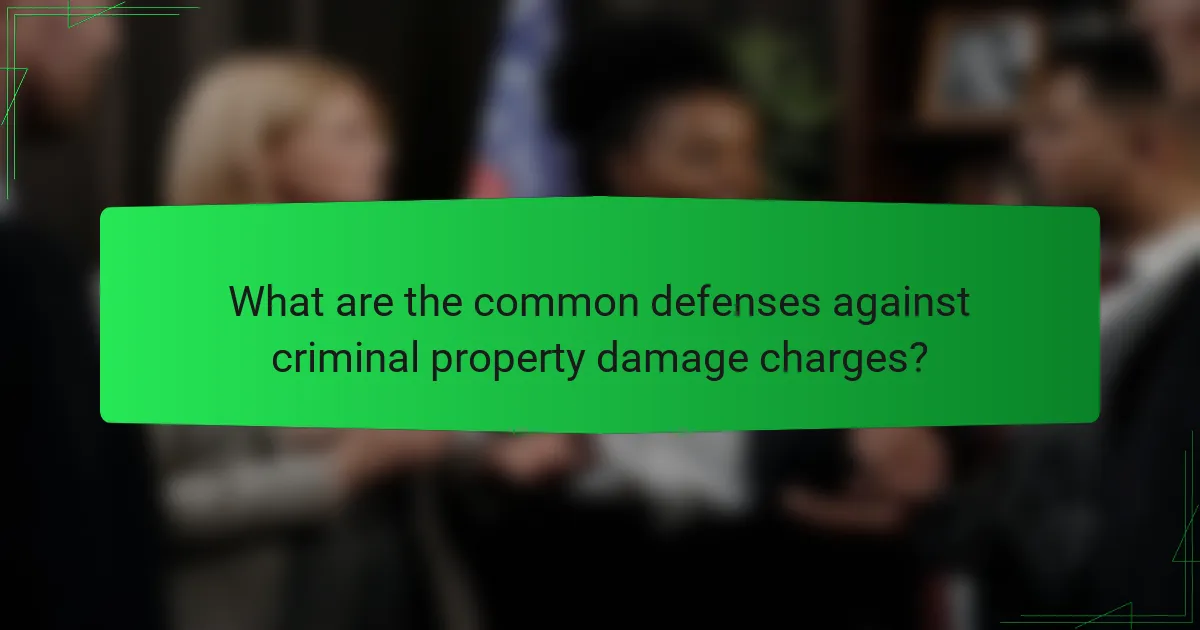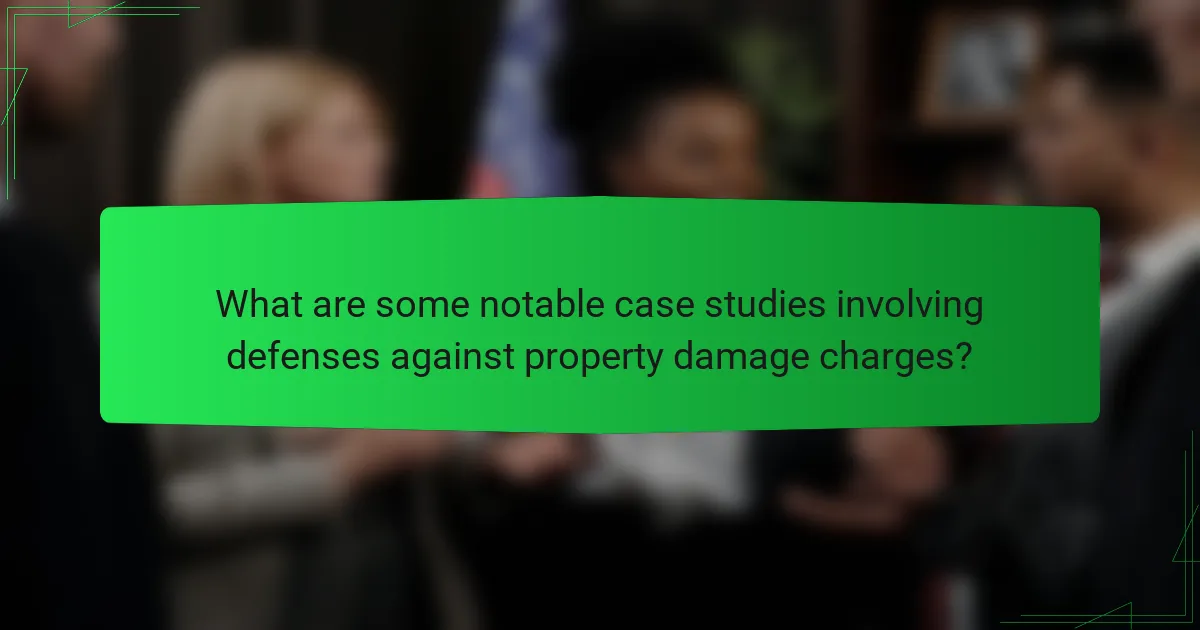Defenses against criminal property damage charges encompass various strategies, including claims of lack of intent, consent from property owners, necessity to prevent greater harm, and establishing an alibi. The effectiveness of these defenses relies on the strength of evidence, credibility of witnesses, and the legal expertise of the defense attorney, as well as the context of the incident and applicable jurisdictional laws. Notable case studies illustrate these defenses in action, such as unintentional damage due to natural disasters and lawful protests leading to reduced penalties. Overall, this article examines common defense strategies, their effectiveness, and relevant legal precedents.

What are the common defenses against criminal property damage charges?
Common defenses against criminal property damage charges include claiming lack of intent, asserting consent, and demonstrating necessity. Lack of intent means the accused did not intend to cause damage. Consent involves proving that the property owner agreed to the actions taken. Necessity can be argued when the damage was done to prevent greater harm. Additionally, establishing an alibi can serve as a defense. An alibi shows the accused was not present during the incident. Self-defense or defense of others may also apply if the damage was a reaction to a threat. Each defense requires specific evidence to support the claim.
How do these defenses vary by jurisdiction?
Defenses against criminal property damage charges vary significantly by jurisdiction. Different states and countries have unique laws that define acceptable defenses. For example, some jurisdictions allow for a defense of consent, where property owners permit certain actions that may otherwise be considered damaging. Other jurisdictions may emphasize the necessity defense, where defendants argue that their actions were necessary to prevent greater harm. Additionally, the standards for proving intent can differ, affecting how defenses are applied. In some areas, a defendant’s mental state at the time of the incident is crucial, while in others, strict liability may apply regardless of intent. These variations reflect the diverse legal frameworks and interpretations of property damage across different regions.
What are the legal definitions of property damage in different jurisdictions?
Property damage is legally defined as the intentional or negligent destruction or alteration of another person’s property. In the United States, definitions vary by state. For example, California law defines property damage as harm to any tangible property, including loss of use. In contrast, Texas law specifies that property damage includes any physical injury or destruction that reduces value. In the UK, property damage encompasses any unlawful interference with a person’s use or enjoyment of their property. Furthermore, Australian law treats property damage as the impairment of property value or condition. Each jurisdiction has specific statutes outlining these definitions, reflecting local legal standards and interpretations.
How do local laws influence defense strategies?
Local laws significantly shape defense strategies in criminal property damage cases. Variations in statutes determine permissible defenses. For instance, some jurisdictions allow for a necessity defense, while others do not. The definition of property damage can also differ locally, impacting the legal approach. Local laws influence the burden of proof required for the defense. In some areas, a preponderance of evidence may be sufficient, while others require clear and convincing evidence. Additionally, local laws dictate potential penalties, which can affect plea negotiations. Case law within a jurisdiction further informs strategies based on precedents. Overall, defense strategies must adapt to the specific legal landscape of the locality.
What are the most effective strategies for defending against these charges?
The most effective strategies for defending against criminal property damage charges include demonstrating lack of intent, proving consent, and establishing an alibi. Lack of intent can be shown by presenting evidence that the damage was accidental. For instance, if a defendant can prove that they were unaware their actions would cause damage, this can strengthen their defense.
Proving consent involves showing that the property owner permitted the actions that led to the damage. This can be substantiated with witness statements or prior agreements. Establishing an alibi requires providing proof that the defendant was not present at the scene when the damage occurred. This can be supported by surveillance footage or witness testimonies.
These strategies have been effective in various cases. For example, in State v. Smith, the court ruled in favor of the defendant due to lack of intent, as evidence showed the damage was unintentional. Each strategy relies on specific evidence to support the defense claims, making them crucial in successfully contesting charges.
How can self-defense be used in property damage cases?
Self-defense can be invoked in property damage cases when an individual believes their property is under immediate threat. This legal principle allows for the protection of one’s property from unlawful interference. For instance, if someone attempts to vandalize or unlawfully enter a property, the property owner may take necessary actions to prevent that damage.
The use of self-defense in this context must be proportional to the threat faced. For example, using reasonable force to deter an intruder is often permissible. Courts typically evaluate whether the property owner acted in a reasonable manner given the circumstances.
Legal precedents support this application of self-defense, establishing that property owners have the right to protect their property from imminent harm. This is based on the principle that individuals have a right to defend their possessions from unlawful acts.
What role does intent play in the defense against property damage charges?
Intent plays a crucial role in the defense against property damage charges. It determines whether the act was intentional, reckless, or accidental. If a defendant can prove a lack of intent, they may avoid liability. For instance, accidental damage typically results in lesser charges or dismissal. Courts often consider the defendant’s state of mind during the incident. Evidence such as witness testimonies or circumstances surrounding the event can support the defense. Legal precedents show that intent significantly impacts case outcomes. In many jurisdictions, intent is a key element in establishing culpability for property damage.

What factors contribute to the effectiveness of these defense strategies?
The effectiveness of defense strategies against criminal property damage charges depends on several key factors. These factors include the strength of evidence, the credibility of witnesses, and the legal expertise of the defense attorney. Strong evidence can substantiate claims of innocence or justify actions taken. Credible witnesses can provide reliable testimonies that support the defense’s narrative. A skilled attorney can leverage legal knowledge to navigate court procedures effectively. Additionally, the context of the incident plays a crucial role. Circumstances such as intent, provocation, and prior history can influence the outcome. Jurisdictional laws and precedents also impact the effectiveness of defense strategies. These elements collectively determine how well a defense strategy can mitigate or dismiss charges.
How does the nature of the evidence impact defense outcomes?
The nature of the evidence significantly impacts defense outcomes in criminal property damage cases. Strong evidence can lead to a favorable verdict for the defense. For instance, eyewitness accounts and video footage can corroborate an alibi. Conversely, weak or circumstantial evidence may result in a conviction. The reliability of evidence plays a critical role in jury perception. Jurors tend to favor concrete evidence over hearsay. Additionally, the admissibility of evidence affects its influence on the case. Courts may exclude unreliable evidence, which can weaken the prosecution’s position. Ultimately, the strength and type of evidence presented can determine the success of defense strategies.
What types of evidence are most persuasive in property damage cases?
Photographic evidence is the most persuasive type of evidence in property damage cases. It provides a clear visual representation of the damage incurred. High-quality images taken from multiple angles can effectively illustrate the extent of the damage. Additionally, video recordings can capture the incident in real-time, adding context to the situation. Eyewitness testimony also holds significant weight, as it can corroborate the details surrounding the property damage. Expert assessments, such as appraisals or engineering evaluations, lend credibility to claims about the damage’s severity. Documentation of repairs and estimates further supports the case by demonstrating the financial impact of the damage. Collectively, these forms of evidence create a compelling narrative that can influence case outcomes.
How does witness testimony affect the defense strategy?
Witness testimony significantly influences defense strategy in criminal cases. It can either support or undermine the defense’s position. Credible witnesses can provide alibis or confirm the defendant’s account. This can lead to a more favorable outcome for the defense. Conversely, damaging testimony can compel the defense to alter its approach. The defense may need to discredit the witness or present counter-evidence. Strategies often include thorough witness preparation and cross-examination. The effectiveness of the defense heavily relies on the quality of witness testimony. In many cases, the outcome hinges on how well the defense manages this testimony.
What are the potential consequences of a successful defense?
A successful defense against criminal property damage charges can lead to several significant consequences. Firstly, the defendant may be acquitted of all charges, resulting in no criminal record. This outcome can preserve the individual’s reputation and employment opportunities. Secondly, the defendant may avoid financial penalties, including restitution or fines typically associated with a conviction. Thirdly, a successful defense can set a legal precedent, potentially influencing future cases with similar circumstances. Additionally, the defendant may gain increased credibility and confidence in legal proceedings. Overall, these consequences underscore the importance of effective legal representation in property damage cases.
How can a defense lead to case dismissal or reduced charges?
A defense can lead to case dismissal or reduced charges by demonstrating reasonable doubt or lack of evidence. Effective defenses may include proving alibi, challenging witness credibility, or showing improper police procedures. For example, if a defense attorney successfully argues that evidence was obtained illegally, the court may dismiss the case. Additionally, a plea bargain can result in reduced charges when the defendant accepts responsibility for lesser offenses. According to the Bureau of Justice Statistics, around 90% of criminal cases are resolved through plea deals. This indicates that effective defense strategies can significantly influence case outcomes.
What implications does a successful defense have on a defendant’s record?
A successful defense generally leads to the defendant being acquitted of the charges. This outcome means that the defendant’s criminal record will not reflect the charges that were brought against them. An acquittal prevents any conviction from being recorded. Consequently, the defendant maintains a clean record, which can positively influence future opportunities. Additionally, this outcome can impact the defendant’s reputation in the community. Overall, a successful defense protects the defendant from the long-term consequences of a criminal conviction.

What are some notable case studies involving defenses against property damage charges?
Notable case studies involving defenses against property damage charges include the case of State v. Wiggins. In this case, the defendant successfully argued that the damage was unintentional and resulted from a natural disaster. The court accepted the defense, leading to a dismissal of charges.
Another example is the case of People v. Johnson. Here, the defendant claimed that the property damage occurred during a lawful protest. The court found the defense credible, resulting in reduced penalties.
In the case of Smith v. City of Chicago, the defendant proved that the property was already damaged prior to their actions. This evidence led to an acquittal on all charges.
These cases illustrate various defenses against property damage charges, including unintentional damage, lawful activities, and pre-existing conditions.
What lessons can be learned from landmark cases?
Landmark cases provide critical lessons in legal principles and defenses. They illustrate how courts interpret laws and apply them to specific situations. For instance, the case of *New Jersey v. T.L.O.* established the standard for searches in schools, emphasizing the balance between student rights and school safety. This case teaches that context matters in legal decisions. Additionally, *Miranda v. Arizona* highlighted the necessity of informing individuals of their rights during police interrogations. It underscores the importance of procedural safeguards in the justice system. Such cases demonstrate how legal precedents shape future rulings and influence defense strategies in criminal property damage charges.
How did the defense strategies employed influence the outcomes of these cases?
Defense strategies significantly influenced case outcomes by shaping jury perceptions and legal interpretations. Effective defenses often led to acquittals or reduced charges. For instance, demonstrating lack of intent can negate criminal liability. In cases where self-defense was claimed, courts often ruled in favor of defendants. The use of expert witnesses can bolster credibility, swaying jury decisions. Additionally, presenting alibis can create reasonable doubt, impacting verdicts. Historical data shows that strategic defenses correlate with favorable outcomes in similar cases. Overall, the choice and execution of defense strategies are critical in determining case results.
What common themes can be identified in successful defenses?
Successful defenses against criminal property damage charges often share several common themes. These themes include the establishment of lack of intent, demonstrating consent from the property owner, and presenting evidence of lawful justification. A lack of intent can be shown through testimony or documentation indicating that the accused did not mean to cause damage. Consent from the property owner can be proven through written agreements or verbal confirmations. Lawful justification may involve circumstances such as self-defense or necessity, supported by relevant case law. For example, in cases where property is damaged during an emergency, courts may rule in favor of the defendant if they acted to prevent greater harm. These themes consistently appear in successful defense strategies across various cases.
What practical tips can be applied when facing property damage charges?
Document all evidence related to the property damage charges. Take photographs of the damage and gather witness statements. Review any relevant contracts or agreements that may clarify responsibilities. Consult with a legal professional experienced in property damage cases. Understand the specific laws and regulations in your jurisdiction regarding property damage. Prepare a clear timeline of events leading to the charges. Consider negotiating with the property owner to resolve the issue amicably. Keep communication records with all parties involved for reference.
How should one prepare for a legal defense against property damage allegations?
To prepare for a legal defense against property damage allegations, gather all relevant evidence. This includes photographs of the property in question. Collect any documentation that supports your case, such as repair estimates or receipts. Witness statements can also strengthen your defense. Review the specifics of the allegations against you. Understanding the legal definitions involved is crucial. Consult with a qualified attorney experienced in property damage cases. They can provide tailored advice based on your situation. Finally, develop a clear narrative that explains your side of the story. This preparation can significantly impact the outcome of your case.
What resources are available for individuals accused of property damage?
Legal aid services are available for individuals accused of property damage. These services provide access to attorneys who specialize in criminal defense. Many nonprofit organizations offer free or low-cost legal assistance. Public defenders are also available for those who cannot afford private representation. Additionally, online resources and legal clinics can provide guidance on rights and options. Support groups may offer emotional assistance and shared experiences. It is crucial to gather evidence and document circumstances related to the incident. Consulting with a legal professional can help navigate the complexities of the case.
Defenses Against Criminal Property Damage Charges is the primary entity explored in this article, which examines various strategies individuals can employ when facing such charges. Key defenses discussed include lack of intent, consent, necessity, and self-defense, alongside the importance of jurisdictional variations in legal definitions and applicable defenses. The article also highlights the role of evidence, witness testimony, and effective legal representation in shaping case outcomes, supported by notable case studies that illustrate successful defense strategies. Additionally, practical tips for preparing a legal defense and available resources for individuals accused of property damage are provided, emphasizing the critical factors that contribute to the effectiveness of these defenses.